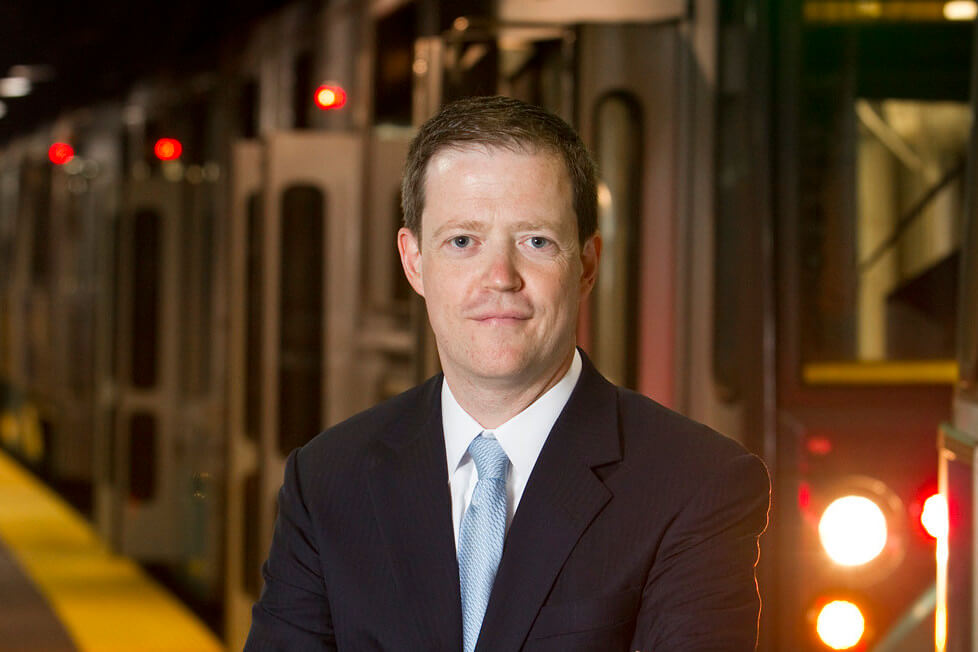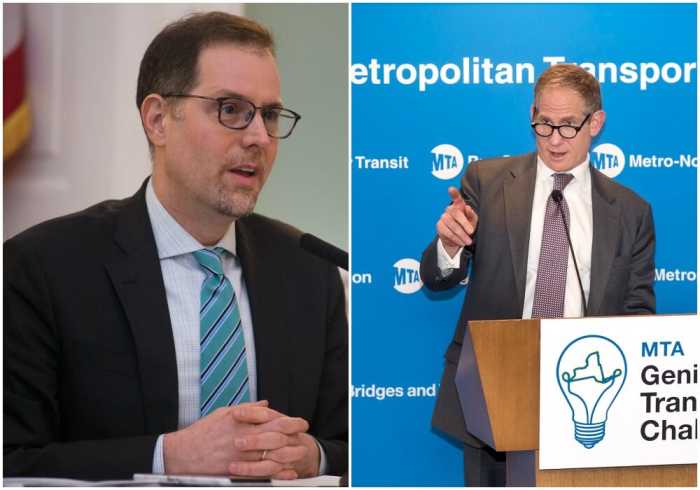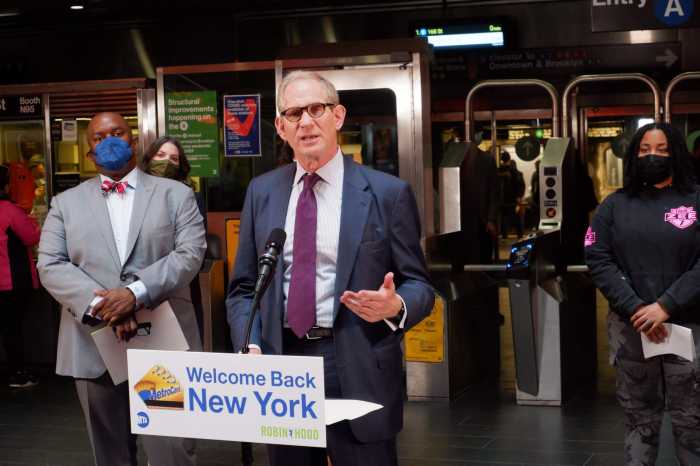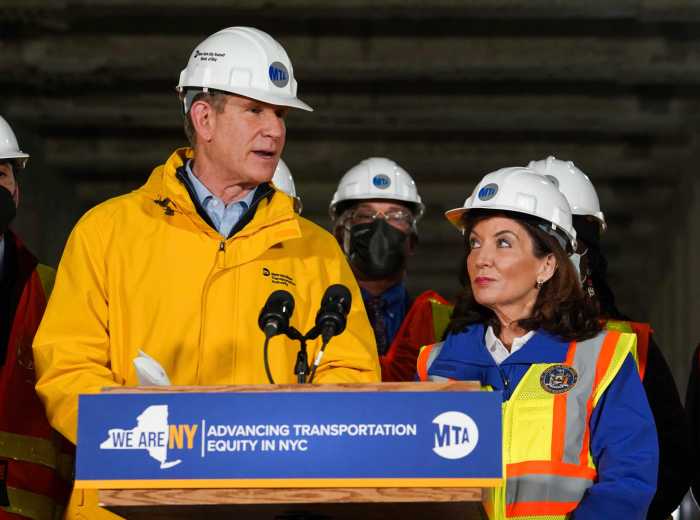The MTA has picked former Massachusetts Secretary of Transportation and consultant executive Rich Davey as the next president of New York City Transit, giving the massive agency a permanent leader for the first time in more than two years.
Davey’s appointment to oversee the city’s sprawling subway system, buses, Access-A-Ride, and Staten Island Railway, was announced by Metropolitan Transportation Authority chief Janno Lieber Wednesday, and the New Englander will replace interim NYCT President Craig Cipriano starting May 2.
He will be the first permanent head of the 54,000-person agency since “Train Daddy” Andy Byford resigned in January 2020.
“To take over an operation as large as New York City Transit, the goal was to find someone with a diversified transit background and strong leadership skills,” said Lieber in a statement.
“Rich is someone New Yorkers should feel confident in as the agency moves forward with major accessibility improvements and other capacity and reliability-oriented upgrades like signal modernization, as well as megaprojects such as Phase 2 of the Second Avenue Subway and, in years to come, Governor Hochul’s Interborough Express,” Lieber added.
Cipriano will become NYCT’s chief operating officer effective the same date, taking on a role previously held by MTA Chief Safety Officer Pat Warren in an acting capacity.
Cipriano was the Transit Agency’s former head of buses and Lieber tapped for the interim leadership role in July after then-interim NYCT President Sarah Feinberg left.
Shipping down from Boston
Davey, 48, lives in Boston and currently works as a partner and director at Boston Consulting Group, leading the large firm’s state and local public sector division.
He previously served as secretary and CEO of the Massachusetts Department of Transportation from 2011 to 2014, in charge of the Bay State’s highways, bridges and tunnels, freight and passenger rail programs, 15 regional transit agencies, and 36 airports.
Davey first worked his way up the public transportation ladder at the Massachusetts Bay Commuter Railroad Company starting in 2003 until becoming general manager Boston’s Massachusetts Bay Transportation Authority, also known as the T, in 2010.
The T runs the city’s four main subway lines, buses, commuter rail, ferry, and paratransit, and the Bostonian will now oversee the far larger system in the Big Apple, which includes 25 subway routes across 472 stations and more than 320 bus lines.
Davey, who said he hasn’t owned a car in 12 years, also served as the CEO of the Boston 2024 campaign to bring the olympics to the city, before joining the Boston Consulting Group, which is one of the world’s largest management consulting firms.
In Wednesday’s announcement, he said that he was connected to New York City by living here during the September 11 terror attacks.
“Living in New York during 9/11 was a seminal moment in my life,” said Davey in a statement. “My experience being a New Yorker that day at that time is why I am coming back, because public service and more importantly public transportation is so important to me. I share the same principles as Chair Lieber — delivering on-time and efficient service, welcoming customers to a safe environment, and constantly looking at ways to improve the system.”
“I hope that whenever my tenure ends, New Yorkers can look back and say that guy from Boston made a difference,” he added.
As the head of the T, Davey once took fare enforcement into his own hands by personally stopping a turnstile hopper while en route to a work event.
After serving as the head of the larger state Transportation Department, he was credited with bringing stability to the agency after three of his predecessors resigned in as many years.
During Davey’s time at the head of the Massachusetts agency, he pushed for tax increases to invest in transportation, and worked to further expansions in light and commuter rails at the T, but also oversaw controversial fare hikes to close an agency deficit.
When asked about his regrets at the time of leaving the public transportation sector eight years ago, Davey said it was to push for a ban on stroller on buses, an issue that has notably become a hot topic at the MTA in recent weeks.
“I wish I didn’t propose banning strollers from buses. That had to be the dumbest idea I floated, but that was mine,” he told MassLive in 2014.
Davey will take over after two years of rocky leadership changes at the MTA and the Governor’s office, which controls the large authority, all against the backdrop of the COVID-19 pandemic.
Byford departed weeks before the virus hit, citing “intolerable” interference by then-Governor Andrew Cuomo.
Cuomo also tried to split the MTA chair and CEO role in two, planning to replace outgoing chief Pat Foye with Lieber as CEO and Feinberg as chairperson.
The ex-Governor launched the 11th-hour maneuver just before lawmakers were scheduled to leave the capital and wrap up the year’s legislative session, but the effort failed and Lieber took over both leadership roles in an acting capacity.
Governor Cuomo resigned in disgrace in August amid to mounting sexual harassment allegations against him, and his successor Governor Kathy Hochul nominated Lieber to stay in his role, for which he was officially confirmed by the state Senate earlier this year.
Business ties
Davey’s current employer, Boston Consulting Group, has done business with the MTA in the past, and one of the company’s senior execs at its New York office, Neal Zuckerman, also sits on the Authority’s board and chairs its finance committee.
In 2017-2018, MTA paid the consulting group $3 million for work on then-Governor Cuomo’s Subway Action Plan to upgrade its aging transit infrastructure.
In March 2020, the MTA board approved hiring the firm, along with three other companies, for $18 million to work on the controversial Transformation Plan to reorganize the agency and cut 2,700 jobs.
The effort was criticized for spending millions on consultants and hiring new executives, and Lieber ended up shutting it down last year, saying he was “not thrilled” with its results.
MTA spokesperson Tim Minton told amNewYork Metro that, despite the board approval, the agency never ended up hiring Boston Consulting Group for the reorganization, because he said transit leaders decided to scale back the use of consultants.
“There was not one dollar that was spent on Transformation consulting with the Boston Consulting Group,” Minton said.




































